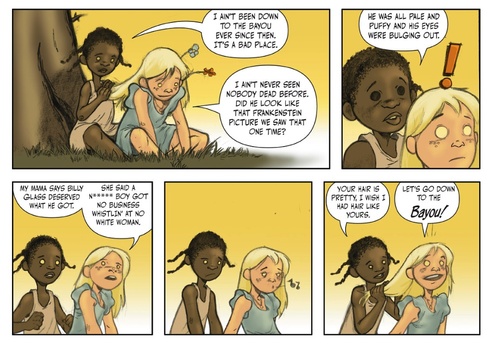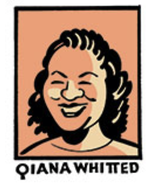|
Originally posted at The Hooded Utilitarian.
Early in Jeremy Love’s comic series, Bayou, the murder of a black child named Billy Glass awakens the supernatural southern landscape that surrounds the story’s young female protagonist, Lee Wagstaff. Lee is forced to swim into the bayou to retrieve Billy’s body and afterwards she describes the experience to her white friend, Lily. Stunned by Lee’s description of the bloated corpse, Lily blurts out, “My mama said Billy Glass deserved what he got. She said a n***** boy got no business whistlin’ at no white woman.” In the wordless panel that follows, Lee’s hands drop as a dismayed expression crosses her face. Beside her, Lily’s eyes lower, her shoulders slouch back, and she lets out a small whistle of her own. Readers familiar with the history of the Jim Crow South know that this two-toned whistle once belonged to Emmett Till – the fourteen-year-old boy from Chicago who was killed in Mississippi in 1955 for allegedly whistling at a white woman.* What we hear, then, in Love’s visual rendering of Lily’s whistle interests me greatly, for those tiny eighth notes generate a tremendous sound. We hear echoes of anti-miscegenation panic, a fear that reverberates unease even as the conversation hastily resumes. We hear the sense of white privilege that attends Lily’s ability to whistle freely, carelessly one could argue, in spite of her naïveté as a child repeating her mother’s words. But I believe that what Love also wants us to hear in this sequence is the “wolf whistle” of a murdered black child, along with the memory of just how much that sound costs. Perhaps what resonates most deeply in the white girl’s whistle are the sounds that Billy (and Emmett) are no longer able to make, were never free to make at all. |
AboutAn archive of my online writing on comics, literature, and culture. (Illustration above by Seth!) Categories
All
Archives
July 2020
|


 RSS Feed
RSS Feed